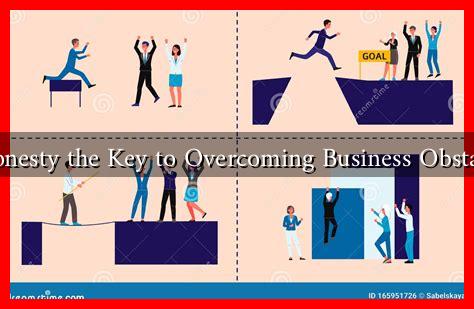-
Table of Contents
- Is Honesty the Key to Overcoming Business Obstacles?
- The Importance of Honesty in Business
- Case Studies: Honesty in Action
- 1. Johnson & Johnson: The Tylenol Crisis
- 2. Patagonia: Environmental Responsibility
- Statistics Supporting Honesty in Business
- Challenges to Honesty in Business
- Conclusion: The Path Forward
Is Honesty the Key to Overcoming Business Obstacles?
In the fast-paced world of business, obstacles are inevitable. From financial challenges to market competition, companies face a myriad of hurdles that can impede growth and success. However, one fundamental principle can serve as a guiding light through these challenges: honesty. This article explores how honesty can be a powerful tool in overcoming business obstacles, supported by examples, case studies, and relevant statistics.
The Importance of Honesty in Business
Honesty is often regarded as a moral virtue, but in the context of business, it transcends ethical considerations. It fosters trust, enhances communication, and builds strong relationships with stakeholders. Here are some key reasons why honesty is crucial in business:
- Trust Building: Honesty cultivates trust among employees, customers, and partners. When stakeholders believe in a company’s integrity, they are more likely to engage positively.
- Enhanced Communication: Open and honest communication reduces misunderstandings and fosters a collaborative environment.
- Reputation Management: A reputation for honesty can differentiate a business in a crowded market, attracting customers who value transparency.
Case Studies: Honesty in Action
Several companies have demonstrated that honesty can lead to overcoming significant business obstacles. Here are a few notable examples:
1. Johnson & Johnson: The Tylenol Crisis
In 1982, Johnson & Johnson faced a major crisis when several people died after consuming cyanide-laced Tylenol capsules. The company’s response was a textbook example of honesty in crisis management. They immediately recalled 31 million bottles of Tylenol, a move that cost them over $100 million. However, their transparency and commitment to consumer safety restored public trust and ultimately led to the re-establishment of Tylenol as a market leader.
2. Patagonia: Environmental Responsibility
Patagonia, an outdoor clothing brand, has built its reputation on honesty and environmental responsibility. The company openly shares its supply chain practices and the environmental impact of its products. This transparency has not only attracted a loyal customer base but has also positioned Patagonia as a leader in sustainable business practices. Their commitment to honesty has helped them navigate challenges in a competitive market.
Statistics Supporting Honesty in Business
Research supports the notion that honesty is beneficial for businesses. According to a study by the Harvard Business Review, companies that prioritize honesty and transparency experience:
- Higher employee engagement and retention rates.
- Increased customer loyalty and satisfaction.
- Improved financial performance over time.
Furthermore, a survey conducted by the EY Global Integrity Report found that 94% of consumers are more likely to be loyal to a brand that is transparent about its business practices.
Challenges to Honesty in Business
While the benefits of honesty are clear, many businesses struggle to maintain transparency. Common challenges include:
- Fear of Repercussions: Companies may fear that being honest about failures or challenges could damage their reputation.
- Competitive Pressure: In highly competitive industries, businesses may feel pressured to exaggerate their successes or downplay their shortcomings.
- Short-Term Focus: Many organizations prioritize short-term gains over long-term relationships, leading to dishonesty.
Conclusion: The Path Forward
In conclusion, honesty is indeed a key to overcoming business obstacles. By fostering trust, enhancing communication, and building a strong reputation, businesses can navigate challenges more effectively. The case studies of Johnson & Johnson and Patagonia illustrate that transparency can lead to long-term success, even in the face of adversity. As the statistics show, consumers and employees alike value honesty, making it a crucial component of any successful business strategy.
Ultimately, embracing honesty may require a cultural shift within organizations, but the rewards—trust, loyalty, and resilience—are well worth the effort. In a world where business challenges are constant, honesty stands out as a timeless strategy for overcoming obstacles and achieving sustainable success.

